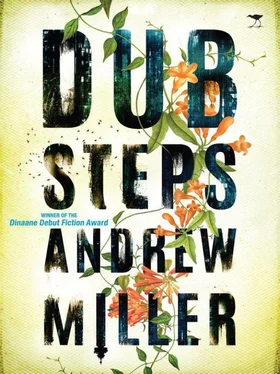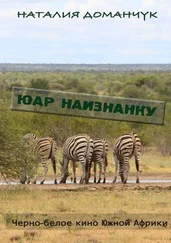And pause.
The generator – an old red thing requiring bicep force and much gas – delivered power, but proved surprisingly hopeless at charging the battery for longer than ten minutes.
The jazz, therefore, was tricky.
I initiated searches for inverters and other, better batteries, but we had, between us, a fool’s understanding of what we were doing, and why we were doing it. And the hard fact is that jazz doesn’t matter that much.
Still, there was a piano tinkling in my heart that evening. And the sun was actually right, just on the golden side of going down. She was in the kitchen, stirring something. I was alongside, chopping, and it felt, for a few moments, like it .
A little later, my heart still quietly whistling, she screamed from the back porch. ‘The water! Roy, the water!’
I dropped my wooden spoon into the garlic and onions and bolted, to find her, jaw chattering, eyes hysterical, pointing at the water tank, the receptacle for her strange and amateurish – yet effective – network of roof rainwater pipes. She was pointing at a crack, seeping and leaking, stretching before our eyes.
‘What do we do?’ She turned to me.
‘Pray.’
In the minute of our watching the crack raced across the plastic tank, which then exploded over us.
I took her hand as we stood there helpless, drenched.
She took it back.
Inside, the onions and the garlic had turned to a heap of hot black mush, billowing fire and smoke. Babalwa grabbed the pan, ran out front and threw it all, everything, down the hill. It skipped a few yards and landed in a pile outside my front door. She turned and marched past my helpless presence, muttering something about useless and men.
As the sun set we sat in candle darkness, each with our own can of beans, each with our own thoughts and ideas about time and space and water and onions and garlic. She apologised, of course. It was no one’s fault, nothing to do with me per se, just frustration, and I accepted, of course, but we both knew that real men don’t say pray.
We scooped the beans, the hopeless beans, and said goodnight.
Later that night Babalwa vomited on my front door. She knocked and vomited and ran back. I followed slowly, grudgingly, then held her hand and her head while she spewed those bad beans back into a bucket, and then another, and then another. All of which I intended to wash, but eventually just kicked down the hill to join our other failures.
‘Roy,’ she called weakly from the shithouse, where her other end balanced over another bucket. ‘We need a plan.’
* * *
We settled after that. Each in our semi-detached flat, we coexisted gently for days, then weeks, then months. Water. Power. Food. Water. Power. Food. It was, ultimately, a simple equation.
Babalwa’s rain-catchment system was restored, rickety and yet ultimately effective. Trouble was, it didn’t rain too much, so every second morning I would drive around the suburbs and fill two twenty-litre barrels from the swimming pools.
I didn’t talk too much about the dream or her telling of it, and neither did she. We talked, instead, about our old lives. And then, the mirror image, our new life. The plan.
The grass on the reserve grew thicker, inching skywards in a knotted mat. I suggested trying to cut it, but Babalwa scoffed. ‘What,’ she asked snidely, ‘you’re gonna mow this hundred-square-metre lawn every week? Why?’
She was compelled by Joburg, by the VR clubs and naps, by the music scene and the graf rebels. In her mind they were all rolled up into a single metropolis where big things happened. She would pick at me with questions, one after the next, the links between each query leading me on to greater descriptive heights. I tried explaining that I had never even seen a graf rebel and that their lives were hard as stones – they were arrested and beaten, their nails were pulled, their balls shocked.
‘To do what they do… to repaint and rebroadcast, eish. It’s heavy. No glamour.’ She looked at me blankly, expectant, as I explained. ‘People like me never even got close. I wrote ads for those walls.’ She deflated, but recalibrated quickly. Kept me going for hours with demands for stories about the clubs. The naps. What is it like, VR sex? Better or worse or completely different? What kind of people? Where did they all end up, the ones in the early scene? Were they literally orgies? How many people did you fuck at one time? Just one nap for the whole night or did you have to log out, change it, then log in again?
I answered as honestly as I could, and realised in the process how detached I had been from the whole thing. To me it just seemed a bit silly. Pretentious. Messy. The dumb stuff ad people do because they need to feel rough, alive, edgy.
But to Babalwa, down in PE, it was the revolution. The very same revolution as the service delivery protests and the graf rebellion. As the global youth.
I did my best to set her straight.
The plan – Babalwa’s plan, really – started with power.
We collected portable solar panels, inverters and batteries. The idea was to build something akin to a home grid, a power source able to do more than boil the kettle or light a bulb.
The bean incident was a reminder that our raider-gatherer lifestyle had a limited time frame, and would have to morph into food production. A life of chickens (presuming we could catch the wild ones) and crops – plucking and hoeing and growing. Soil and harvest.
‘That means,’ said Babalwa, ‘there’s no way we can stay here. It’s all sand. We’ll never grow anything.’
Day to day, I foraged and raided. I drove ceaselessly, peering into the cracks and corners of Port Elizabeth from my obscene, crushed and dented armoured van, flipping ceaselessly through an always evolving stack of raided CDs and sticks and players. Even with all the musical foraging, I spent most of the time in my father’s dance space – not Schulz, but the old boys. The ones who had got him started.
Digweed, Tenaglia, Fatboy Slim, Africanism , Fresh House Flava et al.
Babalwa developed her own orbit. We inched into a mutual ritual that accommodated our disparate paths, our innate need for human contact and our permanent state of metaphysical terror. Seldom, if ever, did we join forces. The raiding was private – each person’s way of communicating internally, of addressing the context and the place and the situation.
I dissolved, for the second time and through calculated effort, my pissing habit, displacing it with an expanding collection of teenage girls’ photo albums, iPods and mobiles. I picked them carefully, cultivating an archetype to which I attached my lusts and dreams.
The girl – my girl – was between fifteen and eighteen years old. She wasn’t a rebel, but she wasn’t a nerd either. She was that quiet girl, still to be properly unveiled, especially to herself. She sat in the middle of the class and her mind drifted as much as it paid attention to geometry, biology and equations. She felt stirrings in her heart and her loins when she thought of him, but she was only just becoming aware of how to deal with them practically, firstly, and with him, secondly. Her underwear was, of course, crisp white. She listened to alternative indie-style sounds. The Canadian scene, but with old-fashioned hip hop and newer broken beats thrown in. She was conversant in local music – she knew her deep house from her kwaito from her trashy Eurobeats.
She read a lot of books. Any book really. Pulp fiction. Poetry. History. She was open. She was waiting. Every now and again she wrote poetry.
She had friends.
Boys.
Girls.
They gathered in groups. Hugged. Held hands. Smoked illicitly, around corners.
Читать дальше












